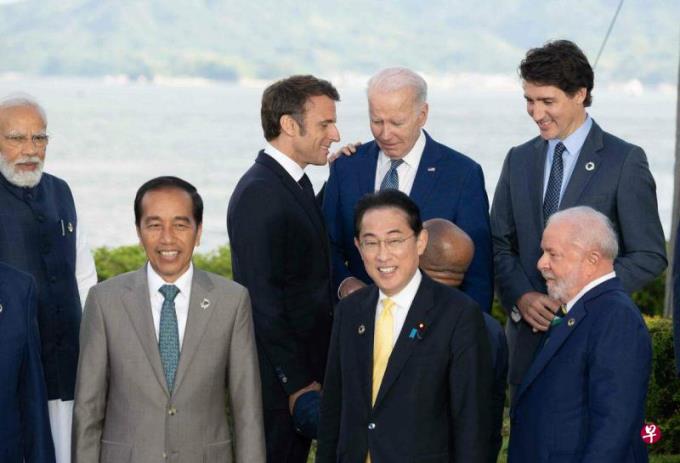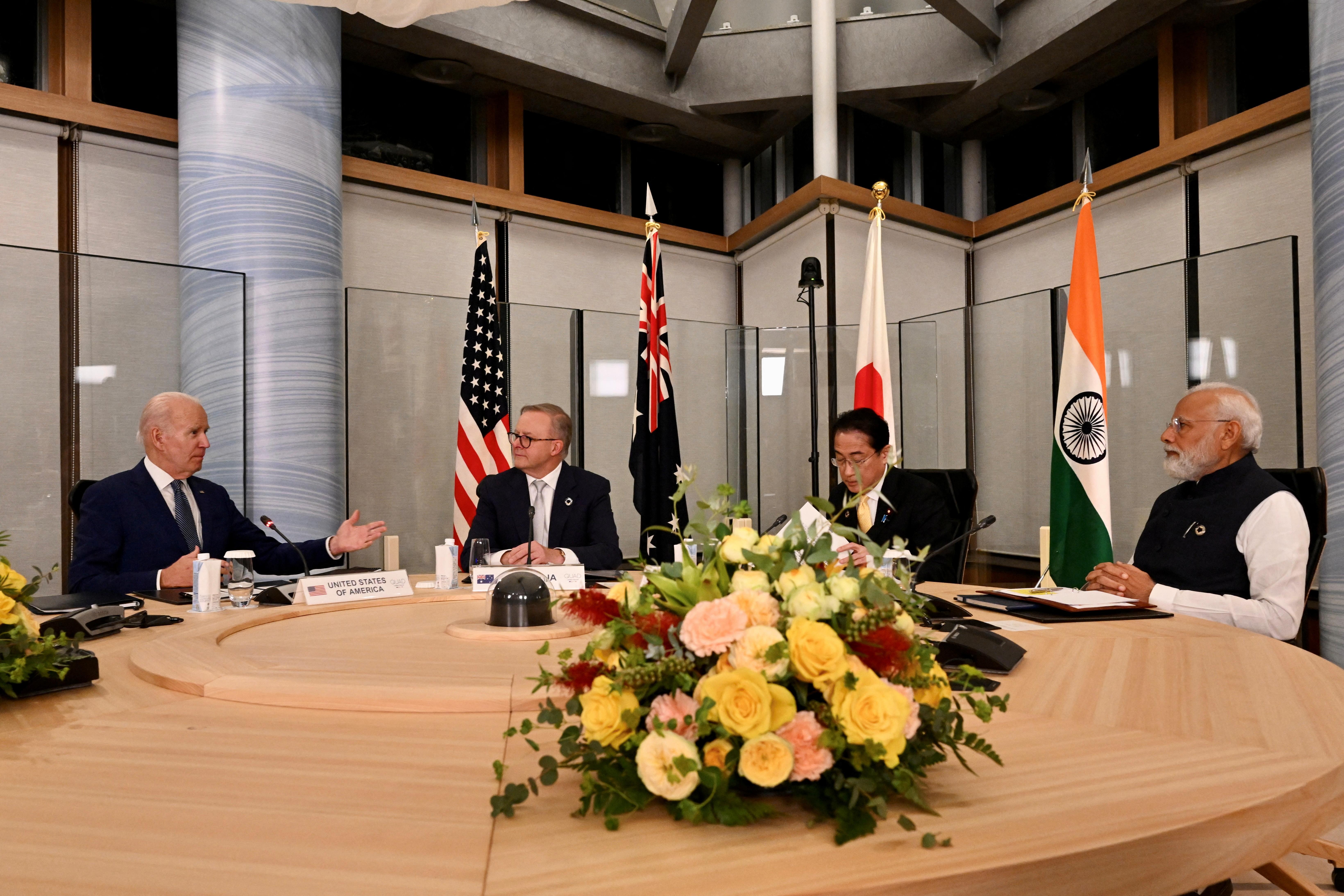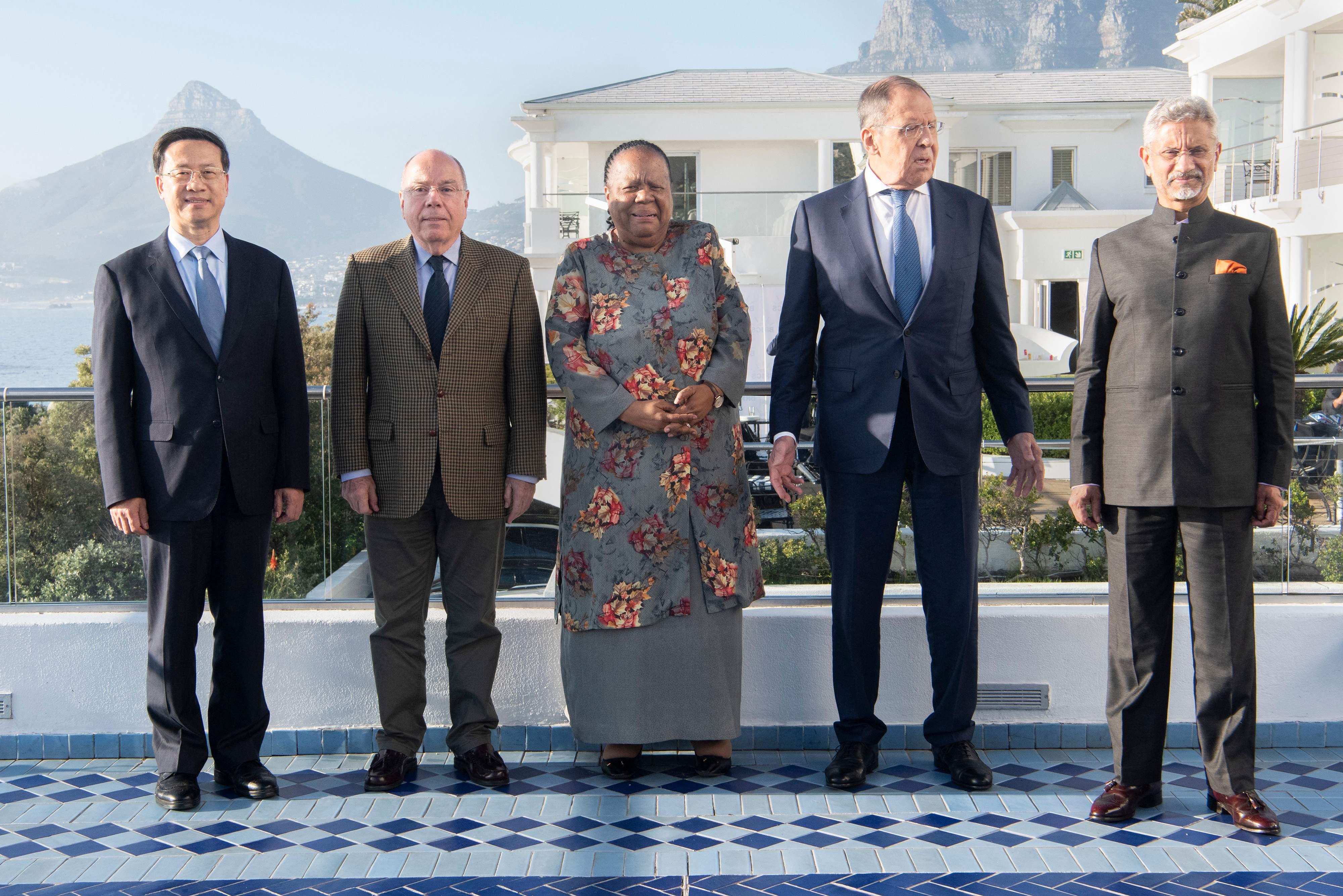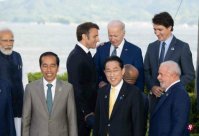
Swing States often mentioned in American politics, which refers to the unbalanced states of the Democratic Party and Republican Party in the United States election, that is, the state voters are swaying in voting to support the Democratic or Republican Party.
The concept of "Swinging Country" extended from this is not to blame these countries to swing or their support can be flipped, but to acknowledge that international cooperation preferences will change and realize that international cooperation is not zero -sum game.EssenceTherefore, countries may be in contact with different partners on the same or similar issues.
The Marshall Foundation of the United States, the Marshall Foundation, listed Brazil, India, Indonesia, and Turkey as early as 2012 as a global swinging country.The latest report released by the Foundation in May this year has also included Saudi Arabia and South Africa.
each has the strength to become a regional strength
The background of the six countries is very different, and they are classified together. The first reason is that they are all members of the G20 (G20) of the 20th Group, and have certain economic strength.The six countries also have sufficient political and economic influence, and have the strength to become a regional power.Some countries have or soon serve as the role of raising their influence. For example, India is the chairman of the G20 this year, South Africa is the chairman of the BRICS country, and Brazil will serve as the rotating chairman of the United Nations Security Council in October.
This shows that they are all influential countries on the world stage, but they are not completely alliance with any superpowers and are unwilling to choose to stand in a team. Instead, they seek independent development and foreign policy.International affairs have greater right to speak and influence.
CLIFF KUPChan, chairman of the Political Risk Consulting Company Eurasian Group, said in a letter to customers that the influence of these six countries has increased, which is related to the long -term historical development and the recent global trend.
This includes China and the United States, which makes all medium -powerful countries more free. It does not have to be loyal to Washington as in the past in the United States.Playing increasingly important roles; they have not formed an alliance because of ideology, and can adopt hard core transactions in foreign policy, which in turn has enhanced their overall impact on international affairs; competition and confrontation between China and the United States want to strive for swingingAlliance with them has increased the influence of swinging the country.
Now it can affect global affairs
In the context of Russia's invasion of Ukraine and Sino -US competition, these six countries are now more affecting global affairs than ever before.
For the Russian and Ukraine War, the six countries have refused to support Western military assistance and sanctions against Russia from the beginning.They believe that this war only affects Europe, not global security, and does not promote national interests in development, debt reduction, food security, energy security and other fields.Therefore, since the outbreak of the war, these six countries have maintained or strengthened trade and other connections with Russia.This weakens the influence of Western sanctions.
Swinging six countries also use the opportunities and challenges brought by the competition between China and the United States to gain more influence in the global system.The comments published by independent analyst Tareq Hasan on the European "modern diplomatic" website pointed out that the six countries have to obtain the maximum benefits from both sides of China and the United States, and at the same time minimize costs and risks.They also try to shape the rules and norms of emerging global order according to their preferences and principles.When they think their interests or values are threatened or violated, they will not hesitate to challenge or resist any big country.
For example, as a member of NATO, Turkey cooperates with the United States on anti -terrorism, Afghanistan, Iran and other issues.It expands its economic connection with China, but also expressed concerns about China's way of treating Xinjiang Uighurs Muslims.
India has deepened its strategic partnership with the United States, especially under the framework of the Quartet Security Dialogue (QUAD). At the same time, India still maintains contact with China on trade and border issues with China.

Saudi Arabia has always maintained a relationship with the United States, especially on security and energy issues, and cooperate with China on economic and technical issues.

Hashan pointed out that the rise of these geopolitical swinging countries will have a significant impact on global order and competition in large powers.
Global order will become more polarized and complicated, because these swinging countries will formulate rules and specifications of emerging systems in accordance with their preferences and principles.They will not accept binary choices between the United States and China, but they will seek to maintain strategic autonomy and flexibility.They will also require global institutions and forums in the United Nations, International Monetary Fund (IMF), World Trade Organization and G20 to have more speech and representative rights.
The competition of great powers will become more delicate and dynamic, because these countries will use their relationships with the United States and China to maximize interests and minimize costs and risks.They will also use the opportunities and challenges brought by the competition between China and the United States to promote their own interests and values.When they are threatened by their own interests or values, they stand up to challenge or resist these big powers.
The scope of research is mainly because Dr. Zhang Lishan, assistant professor of the Institute of National Defense and Strategy of Nanyang University of Technology in Indonesia and India, said in an inquiry in Lianhe Zaobao that India and Indonesia and other countries have been regarded as regional powers.The respective regional order has a huge impact.Suppose they continue to rise in economy or politically, and have gained greater influence in global affairs, these countries will be able to shape the entire international order and contribute to it.
As for whether they can affect the trajectory of the competition in the great power, Dr. Zhang believes that it is still yet to be observed, because it is difficult to predict what it will actually do in the game on the game on the big country, except that they do not want to choose the side team.
Dr. Zhang also believes that the United States and China should strengthen their relations with these countries based on the advantages of these countries, not just to fight for the expansion of influence.
Hashan believes that the United States, China, and Russia should not consider these swinging countries as a matter of course, or ignore their interests and values.They should be in respect and pragmatic attitude, contact with the swinging country and seek the same differences.They should also realize that these countries are not passive viewers or chess pieces in competition, but active participants and partners who shape global order.
Kupu predicts that due to the rise of these swinging countries, more countries in the world may nowAffects geopolitical results.However, except for strong pursuit of national interests, these countries have no obvious behavioral models.This will make the work of predicting geopolitical results more difficult.
The six major computationals are highly pragmatic and self -interest
Heather Conley, chairman of the Marshall Foundation, pointed out in the preface to the foreword in the report that Brazil, India, Indonesia, Saudi Arabia, South Africa, and Turkey have some common characteristics: they are highly pragmatic and self -interest, seek the country and the country and the country.Regional advantages do not think that they are subject to the international order dominated by the United States; some countries are eager to occupy an advantage in the international system.
■ Brazil: The clever hedge
Brazil regards himself as a clever hedge, protecting his own interests by avoiding favors.It seeks to modify the global structure to promote tolerance, strengthen regional integration, and strengthen contact with a wide range of countries, and these countries almost do not need ideas for ideology, including democratic tests.
Brazil does not think that cooperation with different partners conflict with each other.It seeks to deepen contact with China, the European Union, the United States, Russia, and India through the "strategic" alliance and different depth and influence partnerships that it calls.
After Russia invaded Ukraine, Brazil was unwilling to choose its position. Although it voted to support the UN Security Council's decision to condemn the Russian operation at the beginning, it refused to support the sanctions on Russia and also rejected the request of the US and German leaders to sell ammunition to Ukraine.
The UN General Assembly asked Russia's resolution in February this year, but Brazil was the only voting in the BRICS country.

■ India: Bridge of the West and the Global Southern
India is moving closer to the West, although it has a gentle criticism of the Russian and U -iter War, close partnership with Russia, and a foreign policy that is tended to be polarized and striving for strategic independence, it may show that this is not the case.
The increasing intensive relationship with China has increased, making India realize that they must balance strategic autonomy and have a balance between the alliance with like -minded partners on basic political issues.Therefore, in recent years, India has diversified partnerships, and in part, it is achieved by strengthening relations with the United States, Japan, France and Australia.
India has also increasingly regarded itself as a bridge between the West and the Global South (Global South "(refers to low -income countries, geographical location is mostly in the southern hemisphere).Its position on many issues is no longer automatically consistent with the BRICS or G20 partners.On the contrary, its policy is closer to other medium -sized powers.
■ Indonesia: Keep equivalence with China and the United States
Indonesia has a long history of non -alignment, determined to continue to maintain a tradition of competition from large powers, and maintain a pragmatic distance from Beijing and Washington.
This does not exclude the possibility of cooperating with any party when it meets the interests of Indonesia.But it does inspire Jakarta partners to find national defense systems, trade and investment and skills in other places such as Europe, Russia, and Persia to ensure safety, domestic political stability, and improving the living standards of the people.
In terms of the sovereignty dispute with China, Jakarta sought to deal with the problem without US assistance.It does not want Beijing to have an excuse to treat this dispute as a representative of Sino -US competition.However, this does not mean that Indonesia will stand by when the territorial integrity is threatened.The Indonesian armed forces responded to the Chinese Maritime Police Ship in 2016 and 2019.
■ Saudi Arabia: The American Security Allies Relations becomes complicated
As the guardian of the global oil market, Saudi Arabia is still an important security ally in the United States, although Washington recently questioned Lyad's reliability and commitment to rule -based global order.
In October last year, Saudi Arabia refused to increase oil production to alleviate the energy crisis caused by Russia's invasion of Ukraine, which angered Washington, which caused the friction that it could not dissipate quickly.However, the two countries will continue to maintain a close relationship, even if this relationship becomes more complicated.
Saudi Elite's interpretation of emerging order is different from Washington.The primary task of Riyadh is the relationship between balance and major security partners in the United States, main trading partner China, and Oil League+(OPEC+) major partners of Russia.
Saudi Arabia ’s position on the Russian and Ukraine War reflects a common view of the south of the world, that is, rejecting the mainstream interpretation of the West, and regarding the war as the starting point to determine the future global order.Riyadh believes that this conflict is only a conflict between Europe and is unwilling to take a close relationship with Russia for this.
■ South Africa: Hope global power is more decentralized
South Africa attaches great importance to the relationship with Western countries, but these relationships are mainly economic.It has a deeper political partnership with other African countries, BRICS countries, and southern countries around the world.
South Africa hopes to see that global power is more scattered, which is similar to the world view of the BRICS countries and other global southern countries.In terms of global governance, South Africa has always advocated multi -polarization as a way to ensure tolerance and the interests of developing countries.
South Africa has always advocated the reform of the United Nations, as well as the International Monetary Fund (IMF) and the World Bank.In February 2022, South Africa also advocated the reform of the World Trade Organization with other African countries, as well as Cuba and India to promote development and tolerance.
■ Türkiye: Balance the relationship between the world's great powers
Affected by geography and history, the strategy of Turkey is firmly related to the development of the West, while balanced the world's great powers to avoid relying on any major power.
In terms of the Russian and Ukraine War, Turkey voted in the United Nations to favor condemnation of Russia's invasion.Ankara also provided armed drones to Ukraine and prohibited Russian wars from entering the strait connecting the Black Sea and the Mediterranean, but did not join the West to sanctions against Russia.
Turkey is a firm supporter of international order and multilateralism based on rules.At the same time, President Erdogan believes that "the world is not only five" power. This refers to the five permanent members of the United Nations Security Council, reflecting the claims of Erdogan to reform the United Nations, especially the Security Council and other multilateral organizationsEssence



